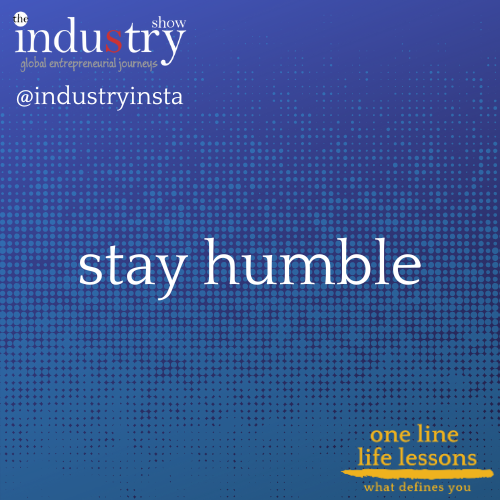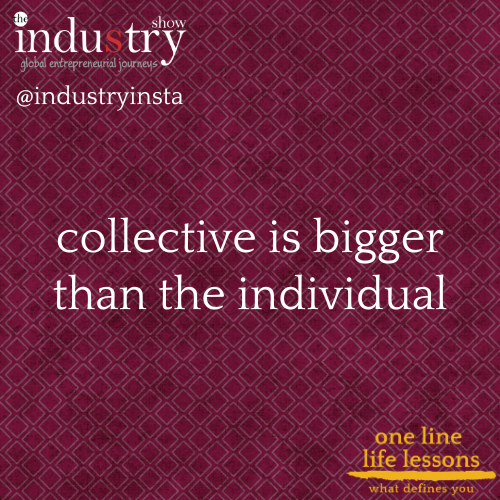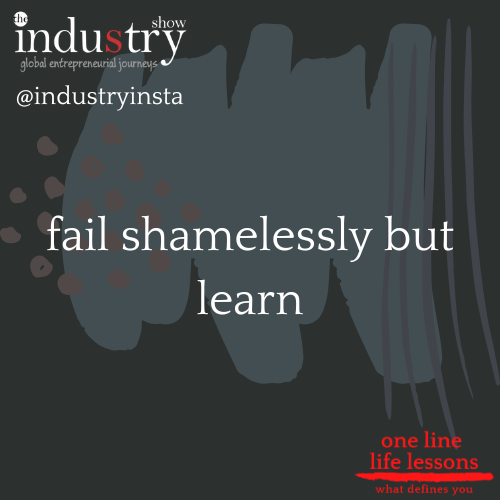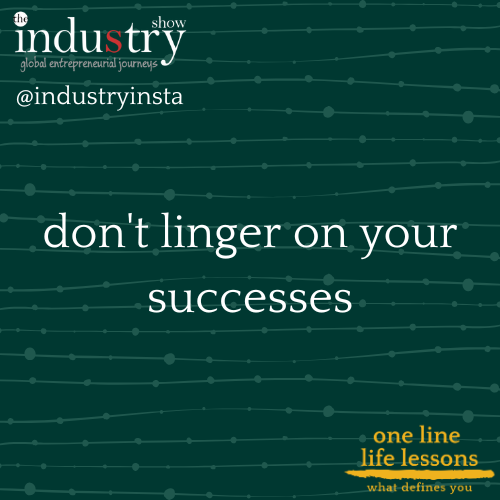Jan 25, 2025
Sriram
Viswanathan
Sriram Viswanathan is the Founding Managing Partner at Celesta Capital – a global deep tech, multi stage venture capital firm. He is a Board Member at several for profit companies and nonprofit organizations. Sriram is an alum of UCLA and IISc.
One Line Life Lessons from Sriram





Episode Highlights
00:00 – Introduction to Sriram Viswanathan
- Sriram discusses his 20-year career at Intel and the motivation behind founding Celesta, a venture capital firm.
02:15 – The Vision for Celesta
- Sriram explains his desire for independent innovation and partnering with like-minded individuals.
04:30 – Resurgence of Hardware Investments
- Highlights the shift in perception regarding hardware, referencing NVIDIA as a case study of significant potential.
06:00 – Investment Strategy
- Celesta’s strategy involves making substantial early-stage investments in approximately 100 companies, primarily within the North America-India corridor.
08:45 – Performance Metrics in Venture Capital
- Discussion of important metrics like DPI, IRR, and MOIC, emphasizing the need for realistic expectations due to inherent risks in venture capital.
10:15 – The Importance of Critical Questioning
- Sriram stresses the necessity of critical questioning among partners and the challenge of detaching emotionally from ideas.
12:00 – Ethical Considerations in AI
- Excitement about the ethical and moral questions surrounding AI, focusing on the complexities of human biases in AI systems.
14:30 – Lessons from Past Experiences
- Reflecting on the launch of WiMAX, Sriram notes that technological success doesn’t ensure commercial viability, highlighting the importance of consumer demand.
16:00 – Benefits of Merging Funds
- Discusses the advantages of merging their fund with another to leverage collective strengths.
18:00 – Personal Philosophy
- Emphasizes personal interests in learning, humility, and the importance of collective success, along with a commitment to authenticity and intellectual honesty.
20:00 – Learning from Failures
- Conveys the significance of learning from failures and maintaining a balanced approach in both life and investment decisions.
Show Transcript
Transcript - Full Episode
[00:00:02 – 00:00:11] Nitin Bajaj
Hey everyone. Welcome to the industry show. I’m your host, Nitin Bajaj. And joining me today is Sriram Viswanathan. Sriram, welcome on the show.
[00:00:11 – 00:00:13] Sriram Viswanathan
Thank you for having me.
[00:00:13 – 00:00:16] Nitin Bajaj
Great to have you here. Let’s start with who is Sriram.
[00:00:18 – 00:00:32] Sriram Viswanathan
Okay. Well, I’m, I’m, a technologist at heart. I’m an investor by profession, and I’m a learner by life.
[00:00:33 – 00:00:53] Nitin Bajaj
That’s amazing. Short and sweet. And looking forward to getting our audience to get to know you a little better. So tell us why, Celesta? What your time in life, phase, career, personal and professional were you at when you decided to start Celesta?
[00:00:54 – 00:03:48] Sriram Viswanathan
Yeah. Well, listen. I I spent 20 years before Zalester, being at Intel from the early nineties till around the 2012 time frame. And that was a period of incredible growth, incredible opportunities. You know, remember, you know, Internet was not there. Mhmm. Remember, we were we were thinking the world was gonna end in y two k. You know, we had the great financial crisis in 2008. But what people don’t understand or perhaps not remember is that there was no, you know, people are not listening to digital music. We were listening to, you know, CDs. DVDs didn’t exist. Video on laptops didn’t exist. So I had this incredible journey of being on the ring side of watching emerging technologies that fundamentally change the world. But we didn’t know that they were gonna change the world at the time that we were in it. So I spent that time. So when I said a lifelong learner, I think I’m perhaps, you know, really lucky to be doing what I do in my professional career as a investor, you know, with my passion for technology. But every day I show up to work, I learn something new because there is an entrepreneur that is telling me that they’ve spent their life thinking about a problem, and they’re gonna come and tell me in a condensed fashion what they have discovered, what they are working on, why they think it’s gonna change the world. And I feel like I am, you know, in a business school every day, every hour of the day. So I learn a lot. Some I like. Some I get. Some I don’t. Some I make mistakes on. So that is what led me when I left Intel to want to do it not just for a large institution like Intel, but for my own self. And that led to what Celesta is today with a few of my partners. We all like each other, and we have a common mission. And they all share some version of what I just said in their own life experiences that enriches them. And so that’s what I do. So that’s how we started Celesta. We all came from different places. My partner, Michael Marks, built Flextronics from 0 to, you know, $30,000,000,000. He was CEO of Tesla, you know, before Elon. My other partner, Nick Brathwaite, was a technologist hardcore, you know, built his own startup and and sold it, and then subsequently started his own private equity fund. And the 3 of us came together, with a whole bunch of other partners. And, when you have the common fabric of what you’re trying to learn and what you’re trying to do with the common mission, it’s just fun.
[00:03:49 – 00:04:20] Nitin Bajaj
Amazing. And I can see that joy. I can see the humility that, you have and that curiosity, that learning that, really drives you and makes you excited to meet, more entrepreneurs and support them, invest in them because you believe in them. Now we are just over a decade into this journey. Give us a sense of the size and scale, but more importantly, the impact Celesta has been able to create in our community.
[00:04:21 – 00:06:17] Sriram Viswanathan
Yeah. Well, listen. I think, you know, we are primarily hardware investors. Semiconductor systems, you know, really the, you know, things close to the metal as it were. Interestingly, that’s all we were doing always. Even in my own career when I was at Intel, I was doing a lot of things hardware related. But there was a period in the valley. Everybody thought hardware was boring. Hardware is not value creating. Hardware is hard. All of that. Some of it is true. Hardware is indeed, you know, difficult to do. But what has happened is in this period, the last 10 years, we’ve become the cool kids again because there’s a company you know, who would have thought NVIDIA would be a $3,000,000,000,000 company? You know? Exxon was the company that was, you know, the most valuable company 15 years ago or 20 years ago. And so now the entire shift to technology and entire shift to hardware because there’s been incredible value, incredible, you know, solutions and products that have been created by the tech by the big companies. Everybody thinks that this is what they were doing all along when it’s actually not true because we actually went on some diversions to SaaS and, you know, consumer Internet and all of that. While all of those businesses had their own place, I think solving more fundamental technology and science problems has a potential to create enduring value. And so Celesta has been doing that, you know, forever, and we’ve all been doing that as individuals forever. So we feel like, you know you know, maybe you say, you know, right place, right time, but we haven’t moved. The the the goodness of this place has come back to the focus where we’ve always been.
[00:06:18 – 00:06:30] Nitin Bajaj
That’s just fascinating. If you will, share us a few numbers in terms of the companies you’ve invested in and, what Nitin they have been able to accomplish.
[00:06:31 – 00:08:45] Sriram Viswanathan
Yeah. Well, listen. I think, relatively speaking, we’re a small firm. In venture, when people say they have 5, $10,000,000,000 funds, they’re not venture capital firms. Venture capital is built on small capital, putting small amounts of money, you know, theory of constraints. When you have when you’re flush with capital, bad behavior, you know, creeps in. Valuations go out of whack. Entrepreneurs feel very entitled. All of these things happen. Right? So we have invested in 100 companies. You know, 30 ish companies have exited already. You know, we have, you know, 60 plus companies that are very active. We invest primarily in the, North America, India corridor. And we are early stage investors, so we write early stage checks. Our check sizes typically are, you know, between $1020,000,000 in a company, and we stay on with this company for as long as we can. And then we try to find an exit. Our expectation is that, you know, our funds that have done historically, you know, we are now on our 5th fund, are we are in the top decile of returns, actual returns, DPI, when you benchmark us against CalPERS or, you know, our, Cambridge, numbers. Because returning money to investors is the number one thing. And, you know, IRR is important. MOIC is important, but DPI is what makes sense. The actual distribution, cash on cash distribution to the investors. So we have actually, you know, raised, let’s let’s say, $1,200,000,000 We have returned $1,400,000,000 And our portfolio is worth north of a $1,000,000,000 left with 60 companies in the portfolio. So our expectation is that if we continue to return money, people will pay attention and give us more money, and we will create more enduring companies. So that’s kind of the quantitative measure of how we look at things.
[00:08:46 – 00:09:18] Nitin Bajaj
Sriram, first off, congratulations to you, to your partners and the team for building a fascinating organization that is built on the right values. And, that’s why you’re attracting the right kind of companies, And that’s a fascinating success rate. 30 exits. Wow. That’s amazing. Now I would love to get a sense for doing what you do. And as you said, hardware is hard. What is the one big challenge you face?
[00:09:20 – 00:11:49] Sriram Viswanathan
Well, listen. I think, when you’re trying to you know, I I have a saying that my old mentor and boss at Intel would tell me. When Intel was building factories, he would say to me that we’re investing today to build a factory and commit the capital to build a factory, which will be ready in 5 years to build products that have not been designed yet for markets that have not been created yet. So think about the risk, you know, pancaking of risk that Intel would have to do to build a massive, you know, foundry or a factory to build chips that go into your devices that will use multimedia or whatever, which has not been, you know, the use case has not been created. That, in a way, summarizes the life of a venture capitalist because we don’t know. You know, we’re not you know, we don’t have the monopoly on intelligence or smartness. A lot of other smart people. A lot of market conditions change. So we have no idea. So when a entrepreneur shows up, you know, the biggest challenge for any investor is to not to fall in love with the idea so much right at the beginning where you completely ignore the heavy lifting that is required to see that payday. It’s kinda like, you know, overnight success in 10 years. That’s kinda what happens in venture capital. So what the the challenge that one faces is to really keep your expectations realistic while at the same time aspire to touch the sky. So that balance is a daily battle. So you have to keep, you know, straddling those two things constantly. And if you do that, you know, you end up making the right decisions. You have you need constant reinforcement, from other people, in your own partnership that question your assumptions. That inter so one of the exercises that I like to do is if I propose a deal or one of my partners proposes a deal, I like to find out with the other partner, for instance, if he’s proposing a deal. Tell me why I shouldn’t do the deal. Mhmm. Because if I’m proposing the deal, I never think of why I don’t wanna do the deal. I’m thinking of why I wanna do the deal. So that role playing usually would be very helpful. So I I wish we did more of that.
[00:11:50 – 00:11:58] Nitin Bajaj
And I would imagine as you’re playing the balancing act multiple times a day, some meditation and some yoga helps keep the calm.
[00:11:58 – 00:12:20] Sriram Viswanathan
Yeah. Well, you know, for different people, different things. And, you know, maybe some people go run, some people go, you know, be in a quiet room. But I think being centered always and not get you know, I I I don’t like the highs or the lows. Yeah. I think just, you know, keep it Economy. Issues, you know, easy easy as it does. Right? Just keep it slow and steady.
[00:12:20 – 00:12:27] Nitin Bajaj
Makes sense. Now on the flip side of challenges come opportunities. What’s the one that you’re most excited about?
[00:12:28 – 00:12:31] Sriram Viswanathan
Well, listen. I I think everybody talks about AI.
[00:12:31 – 00:12:31] Nitin Bajaj
Mhmm.
[00:12:32 – 00:14:17] Sriram Viswanathan
My thesis when I was in college was in AI. I had to program in LISP in 1985. Okay? Nobody knew what AI was. I didn’t know either. I worked on a project called expert systems for weather radar data interpretation using LISP, predicting tornadoes for the National Severe Storms Observatory in Oklahoma. You know? So this was in my college. I had no idea. Everybody is doing AI. But the more important thing that I’m really excited about is not so much, you know, the next large language model or the next tool. But there are some very fundamental questions that people are asking about, you know, what is the role of AI and the interaction the human interaction you’re gonna have. There are lots of unanswered questions about, you know, AI ethics, AI morals, AI prejudice. You know? Those are issues that I don’t think we’ve even scratched the surface. We’re talking about training. We’re talking about inference. But if you peel the onion beyond the inference, you know, what is the morality that you expect your AI to have? What are the checks and balances to ensure that the the person that’s training doesn’t put their bias and their prejudice and their orientation into the model? How do you build that? I think those are all big challenges. A lot of people, you know, way above my pay grade or or trying to solve it, but I’m very curious how that all comes together. So I’m I’m super excited about how this plays out, you know, with caution, because I think it can cut both ways.
[00:14:17 – 00:14:42] Nitin Bajaj
I agree. Now as we look forward, I would love to pause and reflect and ask you to share 2 moments in your life, Career or personal. One where things did not work out as you’d expected and there was failure lessons that came out of it. And another one where things exceeded your expectations and became a success beyond your imagination.
[00:14:44 – 00:18:08] Sriram Viswanathan
Yeah. Well, listen. I I think, you know, how long is the show? Right? Because there’s always many, many, lessons one learns, that you take from, than, you know, spending time on the successes. I think the the one thing I’ll tell you, I’m doing my time at Intel. I’ll tell you the I’ll I’ll point out the the failure. I worked on, you know, very, very, heavily in launching a new standard for, for wireless. It was called WiMAX. Mhmm. It was actually you’ll remember, it was a way of actually doing mobile broadband beyond 3g Mhmm. Using IEEE, you know, standards, you know, much like Wi Fi. And we’re trying to do that. And we took on the entire cellular industry. You name it. Every large carrier, British Telecom, China Telecom, Vodafone, you know, AT and T, Verizon, all of them, and we launched the standard. While it was incredibly successful as a technology, commercially, it failed. And that’s when you realize the goodness of a technology by itself doesn’t guarantee success. And, you know, I I learned that lesson much later, but it should have been obvious. Because if you remember, you know, before the iPad, the, you know, Newton or or I should say before the pump pilot, the new Newton was there. Mhmm. But the Newton failed, but the pump pilot succeeded. And this was very close to me because I applied that, lesson from that to understand what went wrong in WiMAX because the Newton had better technology than the PalmPilot. But the PalmPilot was successful because it’s catered to a particular need of the consumer. So shooting above the curve on technology for technology’s sake is never a good idea. And, of course, you know, Clayton Christensen wrote a book about it. Only the, you know, the innovator’s dilemma. So that’s the book, and that is the biggest lesson I’ve learned. Now the other thing that has worked way better, your second question, than I expected. And I launched a small fund when I left Intel. And I it was a $25,000,000 fund to start with. You know, we raised a little bit more money. But when we actually thought about what are we trying to do in the US India corridor, it made a lot of sense to merge with my other partners who had a fund of their own called WRV, Walden Riverwood Ventures. It made sense because at that time, I realized if the ultimate objective is to back the most interesting companies, the most talented entrepreneurs, it is less important as to who was in control as a firm. And it’s better to have more, you know, smarter partners that you can work with and learn with. And scaling as a as a group is much better than building one’s own platform. That was a lesson, and that has just worked out incredibly well for me, and I’m just in gratitude for that.
[00:18:08 – 00:18:22] Nitin Bajaj
That is amazing. I’m glad that, you know, the wisdom that, prevails us tells us that, if you wanna go fast, go alone. If you wanna go far, go together.
[00:18:22 – 00:18:23] Sriram Viswanathan
Yeah.
[00:18:24 – 00:18:35] Nitin Bajaj
Now amongst all of these things that are happening around, what do you do to take a pause and, enjoy, have fun?
[00:18:36 – 00:19:29] Sriram Viswanathan
Well, listen. I I I have varied tastes. I I read a lot. I listen to a lot of music. I, I listen to a lot of podcasts. I have more recently stopped watching the news. That has really created an incredible amount of mental balance and and and peace. And so my advice would be don’t watch the news. And, so I I I’ll I’ll I’ll read a lot, and my, interest vary from physics to philosophy to to just the new things that, you know, that, you know, we can learn every day. So I’m you know, one of my partners, when I sent him something, which was just intriguing, as a math problem, He said to me, you’re weird. And I said, and I’m proud of it, because that’s what I like. I mean, it’s just learning every day, so I I just enjoy it.
[00:19:30 – 00:19:44] Nitin Bajaj
That’s fascinating. Well, first off, I’d like to welcome you to my club. I haven’t watched or read news in coming up on 27 years now. And I’ve been called weird many a times, and I gladly accept it.
[00:19:44 – 00:19:46] Sriram Viswanathan
Yeah. I wear it as a badge of honor. So
[00:19:46 – 00:19:53] Nitin Bajaj
Exactly. Yeah. Now talking about books and podcast, is there one that you would want to share or recommend?
[00:19:54 – 00:20:20] Sriram Viswanathan
Well, listen. I I I absolutely love Acquired. I love Lex Fridman. I love, Nitin Brain. Mhmm. I love, Sam Harris. So that tells you, the range of interest that I have all the way from business to technology to spirituality to world issues, to all of that. So I I just love all of that.
[00:20:20 – 00:20:30] Nitin Bajaj
Fascinating. Now on to my favorite part of the show, we call it the one line life lessons. Sriram, I would love for you to share your one line life lessons with us.
[00:20:31 – 00:20:50] Sriram Viswanathan
Well, listen. I, I know you would I I knew you would ask that. So I had exactly 90 seconds to think about it. But, that said, listen. I you know, everybody’s thing is different. You know, I I don’t have any profound teaching or anything to give people. I’ll tell you what works for me.
[00:20:50 – 00:20:51] Nitin Bajaj
You know,
[00:20:52 – 00:22:07] Sriram Viswanathan
staying humble. You know, I don’t have a monopoly on smartness or knowledge. And more often than not, I’m wrong. So staying humble helps me. And I’ve always valued, as you said, you know, to go far and go with others. I’ve all elective than the individual. I’d rather be part of a group that succeeds than be the one guy that made it happen. And I think it all stems from, you know, intellectual honesty and just being authentic and not be afraid of failing. And, you know, don’t get harp on, you know, the last great thing that you did. You know? If you said that, there are somebody else who’s gonna come and tell you that they did better. So very simply, I have 5 things. Stay humble. The collective is bigger than the individual. Be authentic and intellectually honest. Fail shamelessly, but learn, but don’t linger on your successes. So these are the 5 things. Sometimes, to be honest with you, I get them right with all of these five things. Sometimes I fail. Even in these five things, even following these five things, I fail. So that’s how we think about life.
[00:22:08 – 00:22:22] Nitin Bajaj
Sriram, thank you so much for making the time to share your journey and your story and your life lessons. We really appreciate it. Congratulations on the continued success, and we would love to bring you back on and, share more of your success stories.
[00:22:23 – 00:22:26] Sriram Viswanathan
Nathan, thank you. It was enjoyable to be with you.
[00:22:27 – 00:22:27] Nitin Bajaj
Thank you.
[00:22:28 – 00:22:28] Sriram Viswanathan
Thank you.



